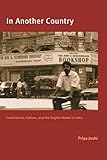In Another Country : Colonialism, Culture, and the English Novel in India / Priya Joshi.
Material type: TextPublisher: New York, NY : Columbia University Press, [2002]Copyright date: ©2002Description: 1 online resource (368 p.)Content type:
TextPublisher: New York, NY : Columbia University Press, [2002]Copyright date: ©2002Description: 1 online resource (368 p.)Content type: - 9780231500906
- 9780231500906
- Anglo-Indian fiction -- History and criticism
- Books and reading -- India -- History
- Fiction -- Appreciation -- India
- Fiction
- Imperialism in literature
- Indic fiction (English) -- History and criticism
- Language and culture -- India
- Postcolonialism -- India
- LITERARY CRITICISM / European / English, Irish, Scottish, Welsh
- 823.809954 823/.809954
- PR9492.2 .J68
- online - DeGruyter
- Issued also in print.
| Item type | Current library | Call number | URL | Status | Notes | Barcode | |
|---|---|---|---|---|---|---|---|
 eBook
eBook
|
Biblioteca "Angelicum" Pont. Univ. S.Tommaso d'Aquino Nuvola online | online - DeGruyter (Browse shelf(Opens below)) | Online access | Not for loan (Accesso limitato) | Accesso per gli utenti autorizzati / Access for authorized users | (dgr)9780231500906 |
Browsing Biblioteca "Angelicum" Pont. Univ. S.Tommaso d'Aquino shelves, Shelving location: Nuvola online Close shelf browser (Hides shelf browser)

|

|

|

|

|

|

|
||
| online - DeGruyter Special Effects : Still in Search of Wonder / | online - DeGruyter Love to Hate : America's Obsession with Hatred and Violence / | online - DeGruyter Active Social Capital : Tracing the Roots of Development and Democracy / | online - DeGruyter In Another Country : Colonialism, Culture, and the English Novel in India / | online - DeGruyter Randall Jarrell and His Age / | online - DeGruyter The Sound of the Kiss, or The Story That Must Never Be Told / | online - DeGruyter Reclaiming the Enlightenment : Toward a Politics of Radical Engagement / |
Frontmatter -- Contents -- Illustrations and Tables -- Acknowledgments -- Preface -- Part 1: Consuming Fiction -- Chapter 1. The Poetical Economy of Consumption -- Chapter 2. The Circulation of Fiction in Indian Libraries, ca. 1835-1901 -- Chapter 3. Readers Write Back: The Macmillan Colonial Library in India -- Part 2. Producing Fiction -- Chapter 4. By Way of Transition: Bankim's Will, or Indigenizing the Novel in India -- Chapter 5. Reforming the Novel: Krupa Satthianadhan, the Woman Who Did -- Chapter 6. The Exile at Home: Ahmed Ali's Twilight in Delhi -- Chapter 7. The Other Modernism, or The Family Romance in English -- Notes -- Bibliography -- Index
restricted access online access with authorization star
http://purl.org/coar/access_right/c_16ec
In a work of stunning archival recovery and interpretive virtuosity, Priya Joshi illuminates the cultural work performed by two kinds of English novels in India during the colonial and postcolonial periods. Spanning the nineteenth and twentieth centuries, readers and writers, empire and nation, consumption and production, In Another Country vividly explores a process by which first readers and then writers of the English novel indigenized the once imperial form and put it to their own uses. Asking what nineteenth-century Indian readers chose to read and why, Joshi shows how these readers transformed the literary and cultural influences of empire. By subsequently analyzing the eventual rise of the English novel in India, she further demonstrates how Indian novelists, from Krupa Satthianadhan to Salman Rushdie, took an alien form in an alien language and used it to address local needs. Taken together in this manner, reading and writing reveal the complex ways in which culture is continually translated and transformed in a colonial and postcolonial context.
Issued also in print.
Mode of access: Internet via World Wide Web.
In English.
Description based on online resource; title from PDF title page (publisher's Web site, viewed 02. Mrz 2022)


